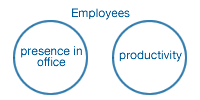The Invisible Employee: Making Absenteeism Profitable
Lately, there’s been a lot of talk in our office about working from home. On one hand, there’s the belief that our work can be done at any time and from any location. On the other hand, that has an effect on how easily we can manage our teams, schedule meetings, etc. I am a proponent of remote working: partly because I commute 45 minutes each way and partly because I’m more productive when I’m away from the office.
In the Chronicle of Higher Education, Mark J. Drozdowski writes about working from home as a fundraiser and manager. He lays out some of the pros and cons of this and I want to share these.
What’s more important than results?
 As Mark writes in the Chronicle, working from home requires that we admit that our notions of productivity are too dependent on presenteeism.
As Mark writes in the Chronicle, working from home requires that we admit that our notions of productivity are too dependent on presenteeism.Eventually, the numbers I generate will dictate success or failure…If they’re getting their jobs done, why worry about the process?
Best Buy has developed the Results-Only Work Environment intended to reduce the workaholic attitude that more hours is better. They’ve had tremendous success with this and it’s gotten a lot of attention:
ROWE stands for Results-Only Work Environment. In a ROWE, each person is free to do whatever they want, whenever they want, as long as the work gets done. Currently, there are two authentic ROWEs—Fortune 100 retailer Best Buy Co, Inc. and J. A. Counter & Associates, a small brokerage firm in New Richmond, WI. At both organizations, the old rules that govern a traditional work environment—core hours, “face time,†pointless meetings, etc.—have been replaced by one rule: focus only on results.
In a service-oriented business, customer service is a huge part of your success. This doesn’t have to take a hit, but you have to be prepared for how it will affect your service levels. Face time has a lot of value, but that also has a lot of costs. Use it wisely.
Yes, sometimes you need to be present.
This is the big discussion in our office. In an emergency, remote working made it difficult to contact some of our staff (myself included). The issue is the breakdown in communication, not the remote working. I could just as easily have been in a client meeting and out of reach. The answer here is protocol and preparedness, not presenteeism.
Mark, again:
My management responsibilities require me to interact more frequently with people on the campus, to put out fires, to slog through budgets and piles of paperwork. That part of the job keeps me campus-bound. Were I an untethered major-gifts officer, however, the duties for which I actually needed to work on the campus would be minimal.
But it attracts talent.
Top talent have a lot of options, which means there are more factors to consider. You can’t possibly compete across the board in all factors, so it’s important to look for the factors that matter the most to employees and work on those. Money is an obvious factor, but for many it’s not the most important; and some factors are very inexpensive. Telecommuting costs very little and matters a lot.
Mark continues:
Imagine a job candidate weighing two offers. One university will furnish a nice office, a computer, a phone, and other supplies necessary for the job. But you have to come in every day unless you are on the road. The other university will furnish the same items, but will allow you to fashion a home office and will require your physical presence on the campus only when necessary. Money being the same, which option is more attractive?
So what’s stopping you?
Mark concludes:
Fund raisers don’t work 9 to 5, so why make them conform to an office culture based on that schedule? Perhaps that’s why some leave for consulting gigs, which often let them live anywhere and travel when necessary. Given similar freedom from a university, might they stay?I imagine insecurities and a perceived loss of control will prevent this notion from gaining traction. Or maybe managers simply don’t trust employees enough to free them from office shackles. But the practice is out there in other fields, and it’s certainly a growing trend. Don’t be surprised when it begins to trickle into our lives as well.
There are valid concerns about working from home, but these usually come back to management: define the criteria for performance management, establish results and goals for the employees, and create protocols for how you handle the absolutely necessary in-person time. As Mark said, these are insecurities of management, not employees. If you don’t trust your employees to get the work done, why would you hire them in the first place? There are so many benefits to working remotely that it’s worth the extra effort for management to overcome any downsides.
1 Comment
Erik Runyon — June 11, 2008
I wholeheartedly agree Mr Grundy. I’d much rather hear my kids playing in the background, than the constant construction going on outside my office window. Well, that and many other benefits working from home provides.
Disclaimer: this comment was posted while the author was working from home.